initiators and artistic directors
-
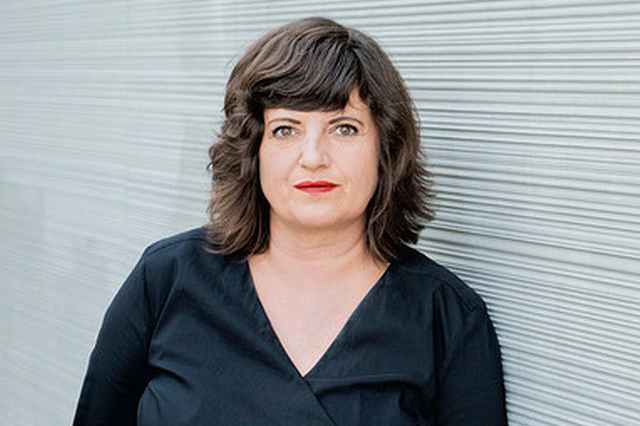
Sally Below
Urbanist, curator, Berlin
Sally Below is an urbanist, curator, and communications expert focusing on urban strategies, architecture, sustainability and society.
Working on urban issues throughout Germany and internationally, she advises and supports public and private organizations in ambitious development and cultural projects, develops formats for dialogue, and collaborates with a broad transdisciplinary network to implement her own projects. She is concerned with how the design of our built environment and the transformation of spaces, as well as new forms of exchange and collaboration, can foster innovation and thus contribute to the development of resilient and sustainable cities and regions.
To implement her concepts, she founded her office sbca in 1999. The office focuses on the fields of sustainable urban and regional development, architecture and building culture, public space and green infrastructures and works primarily with federal ministries and established institutions. Through strategic consulting as well as planning and organizing events and exhibitions, sbca continuously creates inspiring activities and communicative environments that foster dialogue on contemporary urban issues across disciplines and interest groups.
Sally Below passes on her knowledge as a speaker, lecturer and through contributions in specialist media. She is a member of the board of stadtkultur international ev and an active member of various other associations and initiatives.
-
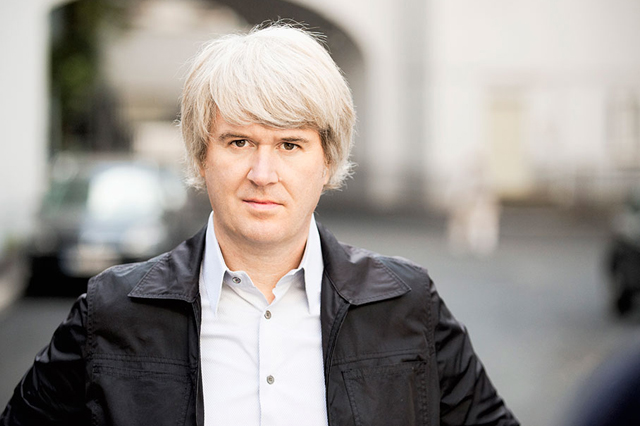
Moritz Henning
Architect, writer, Berlin
Moritz Henning is an architect, independent researcher and writer based in Berlin, Germany. He studied at the Technical University Berlin and is a registered architect in the Berlin Chamber of Architects.
Over the last 20 years he has worked as a freelance project manager for a number of Berlin architectural firms on a wide range of projects, such as schools, hotels and office buildings. Moritz also develops symposia, workshops and discussions, books and magazines and writes for architectural journals such as Bauwelt, Modulor and dbz.
He is particularly interested in the legacy of post-independence architecture in Cambodia, a topic he has dealt with since 2007. In January 2020, the Achitectural Guide Phnom Penh he wrote together with Walter Koditek, was published.
Moritz Henning is a member of docomomo international and the Förderverein Baukultur.
-

Eduard Kögel
Curator, architectural scholar, lecturer, Berlin
Eduard Kögel studied urban and landscape planning at the University of Kassel (GhK) and received his doctorate from the Bauhaus University in Weimar.
He has written widely on the history of architecture; his books include The Chinese City and The Grand Documentation. Ernst Boerschmann and Religious Architecture in China and EXH Design. Swiss quality, Chinese speed.
Eduard Kögel is also a research consultant and program curator for ANCB The Aedes Metropolitan Laboratory Berlin, and curated several exhibitions on contemporary Chinese architecture at the Aedes Architecture Forum in Berlin. Since 2006, he has curated the website chinese-architects.com.
He teaches regularly at the Technical University Berlin and the Bauhaus University Weimar and is a member of the board of stadtkultur international e.V.
-
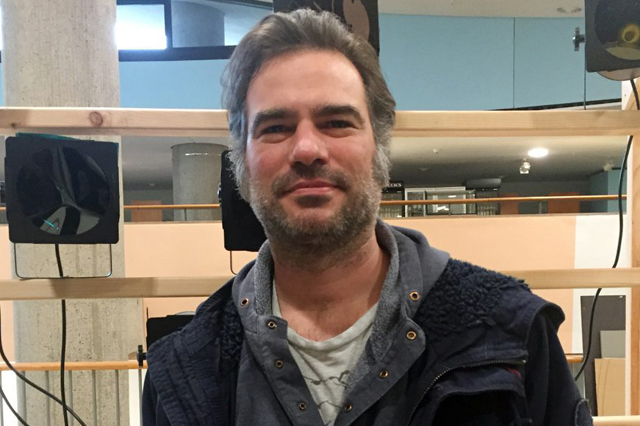
Christian Hiller
Curator, media studies scholar and editor
Christian Hiller is a curator, media studies scholar and editor at ARCH+ Magazine for Architecture and Urbanism. He studied film and media in Bochum, Barcelona and New York.
He has collaborated on interdisciplinary exhibition and research projects such as Talking Cities, Shrinking Cities, Updating Germany, transmediale, Climate Capsules, Art as Research, Salon Kunst + Wissenschaft and Urban Interventions.
For the Bauhaus Dessau Foundation he curated the international touring exhibitions bauhaus.film and Human-Space-Machine and edited several accompanying publications. From 2014 to 2016 he worked as co-curator at HKW Haus der Kulturen der Welt, Berlin, where he was head of research and publications for the Wohnungsfrage project on housing.
Most recently Christian Hiller was a member of the curatorial teams of project bauhaus, Between Spaces, bauhaus imaginista, Edit Film Culture! and An Atlas of Commoning. He has taught and written about architecture, art, design, film, media, performance and urbanism.
Christian was part of the team of Encounters with Southeast Asian Modernism and Contested Modernities. Postcolonial Architecture in Southeast Asia. Since then he has devoted himself entirely to his work for ARCH+.
curators
-

Putu Ayu Pramanasari Agustiananda
Assistant professor at Department of Architecture, Universitas Islam Indonesia (UII), Yogyakarta
Putu Ayu Pramanasari Agustiananda is an assistant professor at Department of Architecture, Universitas Islam Indonesia (UII), Yogyakarta. She holds the degree of Doctor of Engineering from Faculty of Architecture and Urbanism, Bauhaus-Universität Weimar, Germany. She received her M.A. degree in Heritage Studies from Faculty of Architecture, Civil Engineering, and Planning, Brandenburgische Technische Universität Cottbus, Germany with a scholarship from German Academic Exchange Service (DAAD). She obtained a Bachelor of Engineering Degree from Architecture Department Universitas Indonesia.
Nanda is currently a member of Cultural Heritage Expert Team (Tim Ahli Cagar Budaya) of Surakarta City. She joined the Forum for Urban Future in Southeast Asia, a network of Southeast Asian and German experts. She is affiliated with Center for Islamic and Nusantara Architecture (CITAR) Faculty of Civil Engineering and Planning UII. Her research interests include Heritage Conservation and Management. Nanda is assigned as the Secretary of the International Undergraduate Program in Architecture Department of Architecture FCEP UII for the second period of 2022-2026.
Together with her colleague Nensi Golda Yuli, and the team from Yayasan Museum Arsitektur Indonesia, Nensi Golda Yuli conceived the workshop programme and the exhibition for Learning from Mangunwijaya in 2024.
-
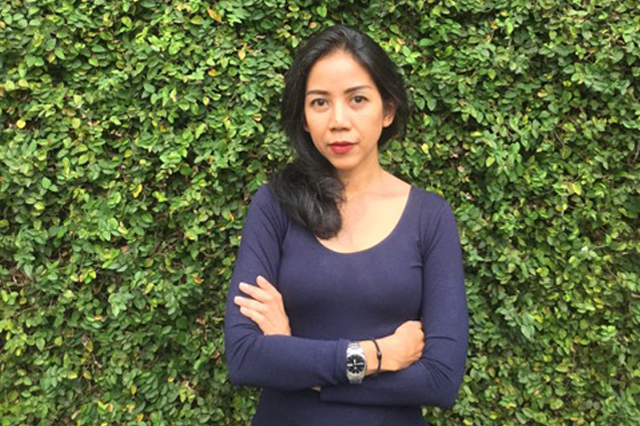
Avianti Armand
Architect, Avianti Armand Studio, curator, architectural scholar, Jakarta
Avianti Armand is an architect, curator, writer, poet and activist. She curated numerous exhibitions and led the curator team for the Indonesian Pavilion at the International Architecture Exhibition in Venice in 2013. She was one of the curators of Tropicality: Revisited (2015) at Deutsches Architekturmuseum Frankfurt. In 2017, she launched arsitekturindonesia.org, a virtual museum and archive repository of Indonesian architecture (with Setiadi Sopandi, Nadia Rinandi and Ria Febriyanti).
She is the recipient of several awards, including the Indonesian Association of Architects Award for her “Kampung House” (Rumah Kampung) in 2008, and the Khatulistiwa Literary Award 2018 for her latest book, Museum Masa Kecil (Museum of Childhood). She has also written several books on architecture and is editor-in-chief of a publication, which specializes in promoting architectural discourse in printed form, classes and discussions.
On behalf of the government of Jakarta, Avianti Armand coordinated a group of architects to design “Child Friendly Integrated Public Spaces” (Ruang Public Terpadu Ramah Anak, 2015–2016), resulting in 123 units throughout the city. She is the initiator of “Nonton, Yuk!” (since 2017), a movie screening activity focusing on films criticizing religious radicalism, in order to fight intolerance and radicalization in Indonesia.
Together with Setiadi Sopandi, Avianti curated one of the two Indonesian contributions to Encounters with Southeast Asian Modernism and Contested Modernities. Postcolonial Architecture in Southeast Asia. Together with Setiadi Sopandi, she also curated the exhibition Dipl.-Ing. Arsitek. German-trained Indonesian Architects from the 1960s.
-
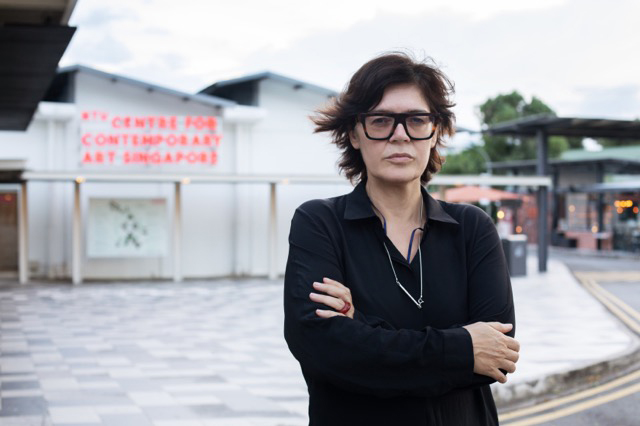
Ute Meta Bauer
Ute Meta Bauer is the Founding Director of the NTU CCA Singapore, and Professor, School of Art, Design and Media, Nanyang Technological University, Singapore. Previously, she was Associate Professor in the Department of Architecture at Massachusetts Institute of Technology (MIT), Cambridge, where she also served as Founding Director of the MIT Program in Art, Culture, and Technology (2005–13).
For more than three decades, she has worked as curator of exhibitions and presentations, connecting contemporary art, film, video, and sound through transdisciplinary formats including as co-curator of Documenta11 and the 3rd berlin biennale for contemporary art. She also co-curated the US Pavilion for the 56th Venice Biennale featuring eminent artist Joan Jonas. She publishes regularly on artistic and curatorial practice.
Ute Meta Bauer was an expedition leader of TBA21-Academy The Current (2015–18) exploring the Pacific Archipelago and littorals that are most impacted by climate change and human interventions in their environments.
Ute Meta Bauer and the NTU CCA Singapore hosted the concluding symposium of Encounters with Southeast Asian Modernism.
-
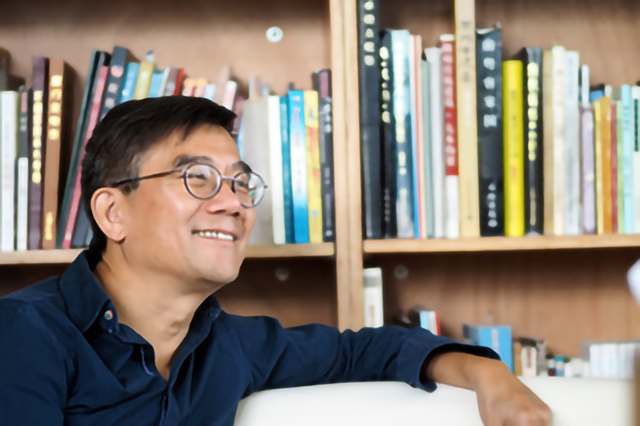
Puay-Peng Ho
Professor, Head of Department of Architecture, School of Design and Environment, National University of Singapore
Professor Puay-Peng Ho is Head of the Department of Architecture at the School of Design and Environment, National University of Singapore (NUS). He studied architecture at the University of Edinburgh, and has practiced architecture in Edinburgh and Singapore. He received his PhD in Art and Architecture History from the School of Oriental and African Studies, University of London.
Prior to joining NUS, he was Professor of Architecture and Honorary Professor of Fine Arts at the Chinese University of Hong Kong (CUHK), where, for 25 years, he served as University Dean of Students, Director of School of Architecture and Head of Department of Architecture.
His main research and publication focus lies in the areas of Buddhist art and architecture, Chinese architectural history, and vernacular architecture. From 2003 to 2016, he was Director of the Centre for Architectural Heritage Research at CUHK and conducted more than 100 conservation and heritage projects in Hong Kong as conservation consultant.
Currently, Puay-Peng Ho is an appointed Patron of the International Dunhuang Project, British Library, and a member of the Senior Advisory Board of the Global Heritage Fund.
Together with Johannes Widodo and Nikhil Joshi, he curated the Singaporean contributions to Encounters with Southeast Asian Modernism and Contested Modernities. Postcolonial Architecture in Southeast Asia.
-

Nikhil Joshi
Architect, activist, lecturer at the Department of Architecture, National University of Singapore
Nikhil Joshi is an architect-academic-activist, currently working as a senior lecturer at the Department of Architecture, National University of Singapore (NUS). He studied at the University of Pune (India), the University of York (UK), and NUS and has research and practical experience in built heritage conservation and community development.
Before joining NUS, Nikhil Joshi worked and taught in India, the UK and Malaysia. His teaching focuses on how cultural heritage can matter to the local communities and how active community engagement can inform the architectural design process.
He is a Fellow of the Royal Geographical Society (UK) and recipient of the Society for the Protection of Ancient Buildings Lethaby Scholarship (SPAB, UK) as well as the Young Scientist (Architecture) VIFRA-Award.
His latest publication is The Mahabodhi Temple at Bodhgaya: Constructing sacred placeness, deconstructing the ‘great case’ of 1895 (2019).
Together with Puay-Peng Ho and Johannes Widodo, Nikhil Joshi, curated the Singaporean contributions to Encounters with Southeast Asian Modernism and Contested Modernities. Postcolonial Architecture in Southeast Asia.
-

Rifandi S. Nugroho
Researcher, writer, editor, Jakarta
Rifandi S. Nugroho is a researcher, writer and currently Editor in Chief of arsitekturindonesia.org, an online repository and museum that focuses on the historical documents about architectural works, figures and discourse in and about Indonesia, especially those produced during and nearing independence until now.
His current research focuses on architecture and mobilization of ideas in the rural-urban area, specifically, around the Japanese Occupation era in Java. He curated “Kota & Seni (City & The Art)” (2018) and “Fraktal City” (2019) in South Tangerang. He also initiated Harjono Sigit Architecture Archive Exhibition (2015) at Wisma-Jerman Surabaya and Kampung Kota Research & Festival in Jakarta (2017-2018) with Jakarta Art Council and Institut Ruangrupa. Since 2017, with friends, he is developing Kolektif Kurator Kampung (KKK).
Together with Avianti Armand and Setiadi Sopandi, Rifandi co-curated one of the two Indonesian contributions to Encounters with Southeast Asian Modernism and Contested Modernities. Postcolonial Architecture in Southeast Asia.
-
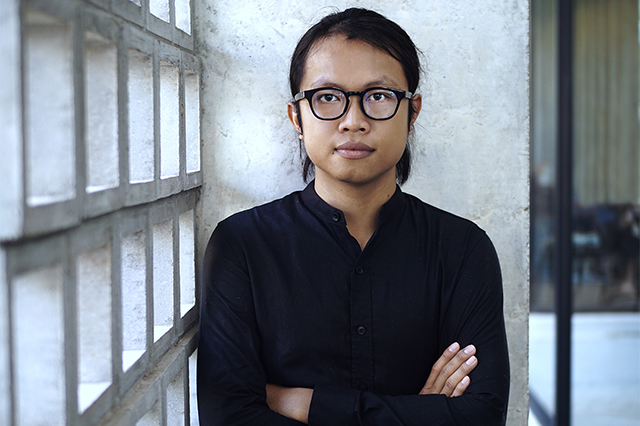
Sereypagna Pen
Architect, urban researcher, Executive Director of The Vann Molyvann Project, Phnom Penh
Sereypagna Pen is a freelance architect and urban researcher. He holds a Bachelor of Architecture and Urbanism from the Royal University of Fine Arts, Phnom Penh and a Master of Architecture from London Metropolitan University.
Since 2009, he has served as Executive Director of The Vann Molyvann Project. With an international team of architects, researchers and students based in Phnom Penh, the project documents the buildings of Vann Molyvann, a prolific architect of the post-independence era in Cambodia. In 2010, he founded Lumhor Journal, an online platform for architecture and urbanism in Cambodia.
His works Genealogy of Urban Form: Phnom Penh, Genealogy of Bassac and Phnom Penh Visions have been featured at several exhibitions and presentations in Cambodia and at select venues in Southeast Asia, Australia and the United States, including the Taipei Biennale 2016 and Sydney Biennale 2018.
Sereypagna Pen has been awarded numerous grants and scholarships from national and international institutions, including: Visiting Scholar at the School of Constructed Environments at Parsons The New School for Design (2012), US/ICOMOS and East West Center (2015), and Graham Foundation (2019–2020).
Pagna is currently a participating scholar in Site and Space in Southeast Asia funded by the Getty Foundation, and pursuing a PhD in Architecture and Urbanism at the University of Hong Kong where he is the recipient of Hong Kong PhD fellowships and the HKU Presidential award.
Together with Lyno Vuth, Pen Sereypagna curated the Cambodian contributions to Encounters with Southeast Asian Modernism and Contested Modernities. Postcolonial Architecture in Southeast Asia.
-
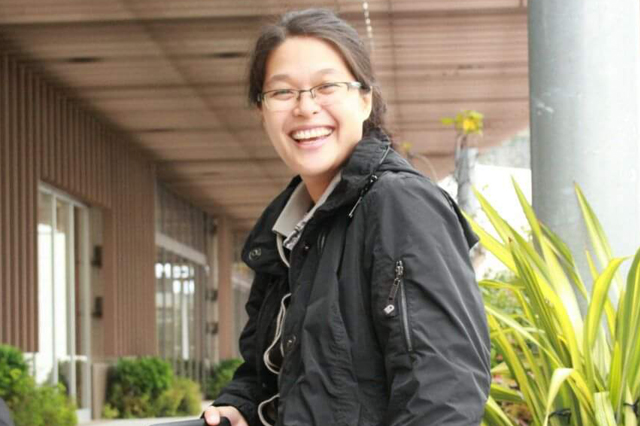
Pwint
Professor, Deputy Head of Department of Architecture, Yangon Technological University
Professor, Deputy Head of Department of Architecture, Yangon Technological University
Dr. Pwint was Professor and Deputy Head of the Department of Architecture at Yangon Technical University (YTU), Myanmar. She studied architecture at Mandalay Technological University (B.Arch) and Yangon Technical University (M.Arch), and received her PhD in Architecture from YTU in 2006.
Dr. Pwint worked in the areas of heritage conservation management, architecture education, sustainable architecture, and vernacular architecture. Her research projects included a study on the rediscovery of Yangon (built heritage, streetscape, and social life); a study on the documentation of the Ordination Hall, Yangon (both SATREPS joint projects with the University of Tokyo); and an analysis of Myanmar architecture education and accreditation in conformity with international accords. She was a local expert for the development of building control guidelines for the Pyu Ancient Cities, a UNSECO World Heritage Site.
Apart from YTU, Pwint has worked with the Myanmar Ministry of Science and Technology. She is a member of the Bagan Master Plan Team, Myanmar ICOMOS, and was an executive member of the Association of Myanmar Architects (2015–2018) and a member of the Three Pyu Ancient Cities Property Management Plan Team (2012–2014).
Together with Win Thant Win Shwin, she curated the Burmese contribution to Encounters with Southeast Asian Modernism.
In January 2020 Pwint passed away unexpectedly. We lost a dear friend and will keep her memory alive.
-
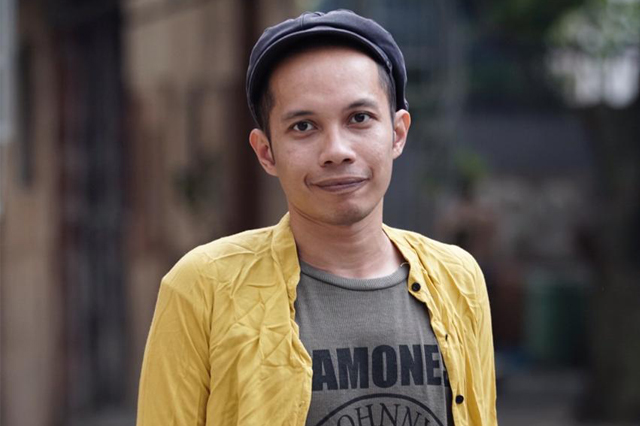
farid rakun
Artist, writer, instigator, ruangrupa, Jakarta
farid rakun is an artist, writer and instigator. He trained as an architect (B.Arch) at the University of Indonesia (UI) in Jakarta and at the Cranbrook Academy of Art, Michigan (M.Arch), and is a visiting lecturer at UI’s Department of Architecture.
He is part of the artists’ collective ruangrupa, with whom he co-curated transACTION: Sonsbeek 2016 in Arnhem, NL. As a nonprofit organization, ruangrupa is active in promoting the advancement of art ideas in the urban context and the broad scope of culture through exhibitions, festivals, art laboratories, workshops, research, and by publishing books, magazines and online journals. ruangrupa holds the collective Artistic Direction for the upcoming documenta 15 (Kassel, 2022).
As an instigator, farid rakun has permeated various global institutions such as Centre Pompidou, La Biennale di Venezia, MMCA Seoul, Sharjah Biennial, Bienal de Sao Paulo, Harun Farocki Institut, Dutch Art Institute (DAI), Creative Time, Haute école d’art et de design (HEAD) Genève, and basis voor actuele kunst (BAK). He has worked for the Jakarta Biennale in different capacities since 2013 and currently serves as its interim director.
-
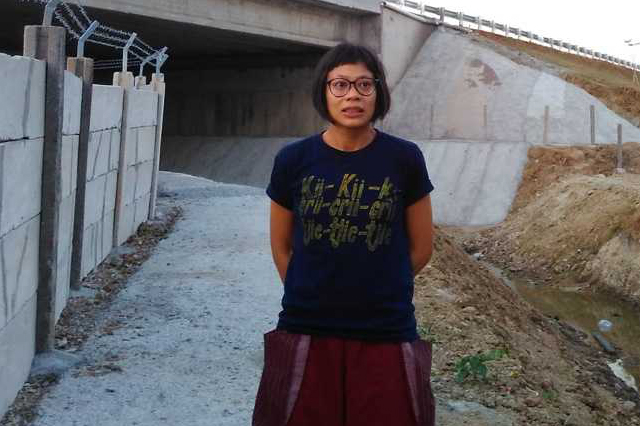
Grace Samboh
Curator, researcher, Jakarta et al.
Grace Samboh lives and works between Yogyakarta, Jakarta and Medan, doing curatorial work as well as groundwork research. She is interested in unravelling how social realities, relationships and the past are articulated in various contemporary practices.
In 2011, she co-founded Hyphen —, a research initiative that aims to publish reference books on recent art practices. The initiative is currently finalizing a book of newly commissioned essays on the Indonesian New Art Movement, to be published in 2019. She is program manager for the Equator Symposium (2012–2022, Yogyakarta Biennale Foundation) and program director of RUBANAH Underground Hub, a gallery-based initiative in Jakarta, established in 2018.
Grace Samboh has been involved in a variety of exhibition projects as curator, advisor or contributor, including Unorganised Response (AutoItalia, London, 2019), Contemporary Worlds: Indonesia (National Gallery of Australia, Canberra, 2019), Choreographed Knowledges (Institute for Art and Society, Yogyakarta, 2019), Returns (Gwangju Biennale, Korea, 2018), Ties of History – Art from Southeast Asia (Metropolitan Museum et. al, Manila, 2018) and SUNSHOWER – Contemporary Art from Southeast Asia 1980s to Now (Mori Art Museum and the National Art Center, Tokyo, 2017).
Crace Samboh/Hyphen – with ruangrupa curated one of the two Indonesian contributions to Encounters with Southeast Asian Modernism and Contested Modernities. Postcolonial Architecture in Southeast Asia.
-
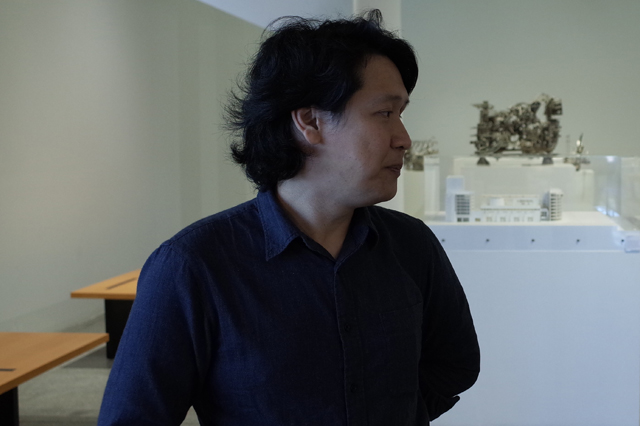
Setiadi Sopandi
Architect, Indra Tata Adilaras Architects, curator, architectural scholar, Jakarta
Setiadi Sopandi is an architect, architectural scholar, lecturer and curator. After studying architecture in Bandung and Singapore, he co-founded the architectural firm Indra Tata Adilaras in Bogor in 2003. He currently teaches Indonesian architectural history at the School of Design at Universitas Pelita Harapan in Karawaci, Tangerang.
Setiadi Sopandi is independently researching, archiving and writing about architecture, with a focus on architects and architectural works from 20th-century Indonesia. He has been a contributor to the modern Asian Architecture Network (mAAN) since 2007, and to the modern Southeast Asian architecture project (mASEANa) since 2015. He is the author of Sejarah Arsitektur: Sebuah Pengantar (Architectural History: An Introduction), published in 2013, and Friedrich Silaban (2017), an extended biography of the most prominent Indonesian modern architect of the 20th century.
He has also co-curated several exhibitions, such as the Indonesian Pavilion at the International Architecture Exhibition in Venice in 2014, Tropicality: Revisited (2015) at Deutsches Architekturmuseum Frankfurt, and Friedrich Silaban, 1912–1984 (2017) at the National Gallery of Indonesia. In 2017, he launched arsitekturindonesia.org, a virtual museum and archive repository of Indonesian architecture (with Avianti Armand, Nadia Rinandi and Ria Febriyanti).
Together with Avianti Armand, Setiadi curated one of the two Indonesian contributions to Encounters with Southeast Asian Modernism and Contested Modernities. Postcolonial Architecture in Southeast Asia. Together with Avianti Armand, he also curated the exhibition Dipl.-Ing. Arsitek. German-trained Indonesian Architects from the 1960s.
-
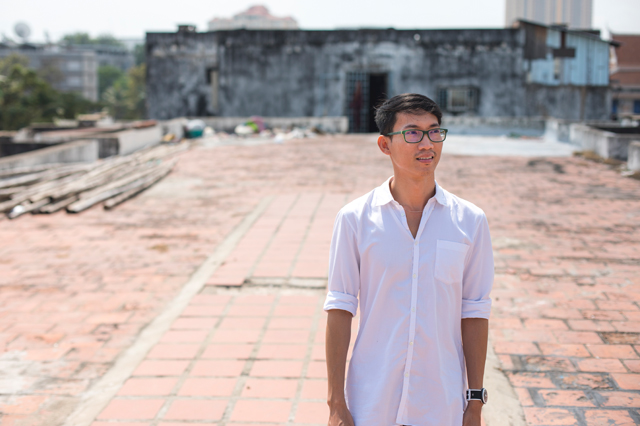
Lyno Vuth
Artist, curator, Artistic Director at Sa Sa Art Projects, Phnom Penh
Lyno Vuth is an artist, curator and co-founding Artistic Director of Sa Sa Art Projects, Phnom Penh’s only Cambodian artist-run space. His artistic and curatorial practices are participatory in nature, exploring communal learning, experimentation and sharing of multiple voices through exchanges. His interest is in the intersection of micro histories, notions of community and the production of social situations.
As an artist, he is particularly interested in the agency of human stories and materiality, and how the audience engages with them. He has presented his artworks widely in Cambodia as well as internationally, including major exhibitions and festivals such as the Asia Pacific Triennial and the Biennale of Sydney, and at institutions such as the Museum of Contemporary Art Taipei, the Gallery of Modern Art Brisbane and the National Gallery of Indonesia, Jakarta.
As a curator, Lyno Vuth is interested in the mobility of material and immaterial goods across places and times, and what is produced or transformed from this mobility. Select curatorial projects include Currents – Phnom Penh Art & Urban Festival 2019 (with Pen Sereypagna) and Chat…Naa (2017) by Arnont Nongyao, Cartel Artspace, Bangkok.
Together with Pen Sereypagna, Lyno Vuth curated the Cambodian contributions to Encounters with Southeast Asian Modernism and Contested Modernities. Postcolonial Architecture in Southeast Asia.
-
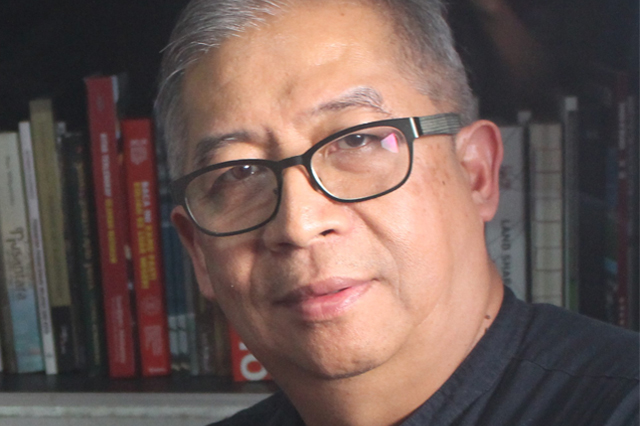
Johannes Widodo
Professor, Department of Architecture, National University of Singapore
Johannes Widodo is Associate Professor at the Department of Architecture, National University of Singapore (NUS). He studied architecture and urban history at Parahyangan Catholic University, Bandung, Indonesia and Katholieke Universiteit Leuven, Belgium, and received his PhD in Architecture form the University of Tokyo, Japan.
He is the director of the MA in Architectural Conservation Program and the Tun Tan Cheng Lock Centre for Asian Architectural and Urban Heritage in Melaka (Malaysia) of the NUS Department of Architecture. His research focus lies in History & Theory of Architecture, Architectural Morphology & Typology, and Architectural Conservation & Heritage Management.
Johannes Widodo is the founder of mAAN (modern Asian Architecture Network), iNTA (International Network of Tropical Architecture), and mASEANa (modern ASEAN architecture) and an active member of different major networks such as ICOMOS (International Committee, Singapore National Committee), UNESCO (Asia Pacific Heritage Awards), DoCoMoMo (Macau, Singapore), SEACHA (South East Asian Cultural Heritage Alliance), and TCHS (The Circle of Human Sustainability).
Together with Puay-Peng Ho and Nikhil Joshi, he curated the Singaporean contributions to Encounters with Southeast Asian Modernism and Contested Modernities. Postcolonial Architecture in Southeast Asia.
-
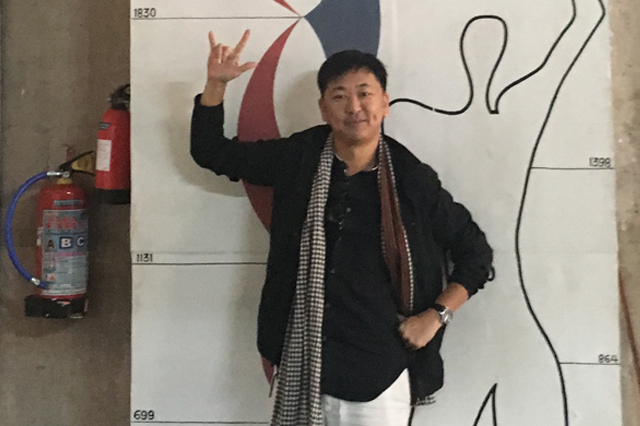
Win Thant Win Shwin
Architect, planner, lecturer at the Department of Architecture, Mandalay Technological University
Win Thant Win Shwin is a Mandalay-based architect, designer and planner. He studied Environmental Design at Arizona State University and Architecture at the Rhode Island School of Design.
Currently Win Thant Win Shwin works as a technical assistant for the Mandalay Civil Development Committee in the fields of urban planning and management. He is also the design director of mandala art + design.
He has worked as a design consultant, architect, planner and project designer for several clients in Myanmar, China and the United States. He is an honorary lecturer at the Department of Architecture of the Mandalay Technological University.
Win Thant Win Shwin is a member of ICOMOS (International Council of Monuments and Sites) in Myanmar, AMID (Association of Myanmar Interior Designers) and the Green Building Committee of the Myanmar Engineering Society, and is a registered architect in the Association of Myanmar Architects.
Together with Pwint, he curated the Burmese contribution to Encounters with Southeast Asian Modernism and contributetd to Contested Modernities. Postcolonial Architecture in Southeast Asia.
-

Nensi Golda Yuli
Well-versed Architecture expert with track record for consistently engaging students in stimulating and relevant material. Conscientious educator with learning objectives of each student in mind. Results-oriented, charismatic speech giver cognizant of test preparedness and student interest, adapting to feedback where necessary. Dynamic Lecturer with 16 years of successful design studio teaching experience. Known for interesting lectures with helpful supporting materials and detail-oriented classroom management. Dedicated to individual student success and comprehensive understanding. Innovative Architecture professor mindful of student engagement and interest who thrives on experiential learning. Time-tested designer of targeted lectures with audience in mind, devising most effective methods for helping participants acquire intended information. Creative thinker with flexibility to allow audience to guide direction of lectures and achieve most out of interdisciplinary education experience.
Together with her colleague Putu Ayu Pramanasari Agustiananda and the team from Yayasan Museum Arsitektur Indonesia, Nensi Golda Yuli conceived the workshop programme and the exhibition for Learning from Mangunwijaya in 2024.
